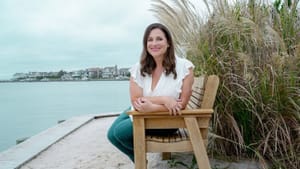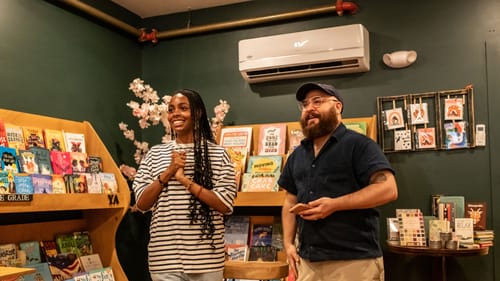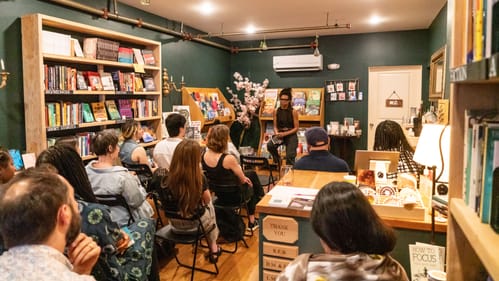Stay in the Loop
BSR publishes on a weekly schedule, with an email newsletter every Wednesday and Thursday morning. There’s no paywall, and subscribing is always free.
A new path for debut novelists
Blue Stoop continues its inclusive literary mission with the Jennifer Weiner Fellowship

This summer, Philly literary hub Blue Stoop continues its mission for inclusive pathways to writing careers with the Jennifer Weiner Fellowship. It will offer an unrestricted stipend for six emerging women-identified prose writers in the United States (including support for travel, living, and childcare expenses) as well as one-on-one mentorship from Jennifer Weiner, a bestselling novelist with Philly roots.
At least two fellows will be local to Philadelphia, at least two will be parents to children under the age of 18, and at least two will be people of color, according to Blue Stoop co-director Taylor Townes. Each fellow will receive a total of $5,000 to support their writing. Blue Stoop is accepting applications through August 26, 2024.
A rare opportunity for emerging writers
“We want to create this cohort and community in the fellowship so that they all get to connect, and so that, regardless of the area, they also have a place to connect with the Blue Stoop community,” Townes said. The fellowship will take place from November to December this year, bringing the selected writers together alongside Blue Stoop’s community of more than 3,000 people.
The fellowship is a rare opportunity that offers a pathway to publication, community support, and (most importantly) funding to emerging writers, which the program defines as anyone without a master’s or doctoral degree in creative writing, or without a published full-length book of prose with a major publisher.

From journalist to novelist
“When I was finishing college, I realized that you can’t apply to the position of debut novelist,” Weiner told BSR.
She and Emma Copley Eisenberg (Blue Stoop’s founder and a current board member) both worked in journalism to supplement or support their journeys to become authors.
An English major at Princeton, Weiner found her first job in journalism at a daily paper in Pennsylvania after a stint at Poynter Institute, a journalism boot camp, at the recommendation of her professor, New Yorker writer John McPhee.
“He said if you become a journalist, you’ll go out into the world and learn how to talk to people. You'll learn how to notice details. You'll learn how to be an observer, which is the most important thing a novelist can be—someone will pay you, and you will learn to write on deadline,” she said.
Weiner has penned 21 books; Eisenberg just published her second book (and first novel), Housemates. Both women dreamed of becoming novelists and followed unique paths to achieve their goals with Philly as their backdrop.
Escaping the crowd
The early aughts brought Weiner to Philadelphia where she worked as a features reporter at the Inquirer and wrote her debut novel Good in Bed, inspired by her real-life experiences.
“I was in my 20s and I had just been dumped, so I had lots of free time. I wrote nights and weekends,” she said. Weiner also contributed columns to major magazines and continues to write for The New York Times today.
Philly wasn’t as flush with aspiring novelists as New York City, where you could stop someone on the subway platform and ask, “How’s the manuscript coming along?” and they would answer you, Weiner said, making it a more comfortable place for her to work and build community.
Building literary equity
In 2020, amid Black Lives Matter protests, similar to standing on that subway platform, Weiner looked around and saw a lot of folks performing the same job she had, who looked like her. The impetus for the fellowship began there.
The publishing industry favors those with the time and money to write, and throughout Weiner’s career, that has often meant white women like her. “I had a job that paid me well. I had paid vacation so I could afford to rent a little cottage in Cape Cod and go there and finish my manuscript, so there was a lot of privilege,” she said.
“I think that the vision of supporting gender-expansive writers, non-men writers, is still very urgent and especially the idea of supporting writers who are parents and writers who are in the Philadelphia area is always very exciting to me,” Eisenberg said.
Philly’s DIY determination
“As someone who's a transplant, I've been so impressed by the DIY spirit and the determination that Philadelphians bring to everything they do, but especially literature,” Blue Stoop co-director Julian Shendelman said.

The literary scene in other cities is often siloed by genres and hierarchy, but in Philly, there is less separation between artists, poets, and fiction writers at all stages of their careers, Eisenberg added.
Blue Stoop’s mission has always been inclusivity, which is why it relies on community support and the generosity of Philadelphians like Weiner. Direct donations to the organization (including a raffle event running through August 29) help to fund free public programs and financial aid for classes and workshops. Look out for Blue Stoop’s fall lineup, ranging from one-hour sessions to nine-week courses that cover diverse genres of poetry, fiction, and nonfiction.
“We want to serve as a hub, or connective tissue between all the various pockets of Philadelphia. That's something we're working toward and putting more into practice, being that connecting force,” Shendelman said.
Sign up for our newsletter
All of the week's new articles, all in one place. Sign up for the free weekly BSR newsletters, and don't miss a conversation.

 Emma Riverso
Emma Riverso